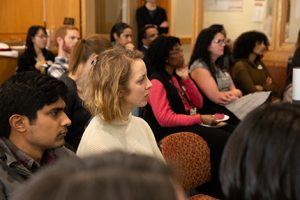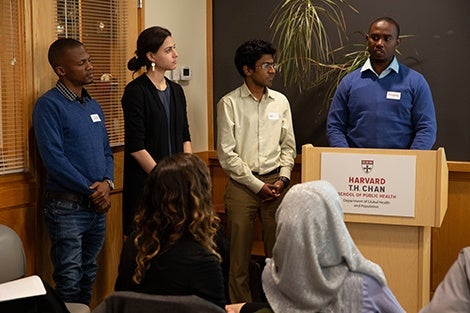Global Cohort of Doctoral Students creates unique partnership model
April 3, 2019 – Doctoral students from Harvard T.H. Chan School of Public Health and several African countries have been working in pairs over the past two years under a student-led effort aimed at fostering cross-cultural learning experiences and spurring equitable and impactful public health research.
The Global Cohort of Doctoral Students helps facilitate connections between students from Harvard Chan School and lower- and middle-income countries (LMICs). Currently there are four student partnerships and nine more on tap, according to the program’s organizers.
The doctoral students from Africa visited Harvard Chan School for a week-long conference in late March. During their visit they worked on presentation skills, drafted a manuscript to share the Global Cohort concept with others, and attended a number of events at the School. At a seminar on March 27 focused on reciprocal capacity building, they and their Harvard Chan partners came together to discuss their shared work, on topics including tuberculosis, HIV, nutrition, and statistical methods.
Harvard Chan School doctoral students in epidemiology Hari Iyer and Chris Andersen developed the idea for the Global Cohort of Doctoral Students in 2017. Both had spent time working abroad before graduate school and had had positive experiences working with and learning from peers in LMICs and wanted to create a partnership model that would facilitate such relationships. They also wanted a model that would go beyond typical “capacity building” work—in which the flow of knowledge goes from people in high-income countries (HICs) to those in LMICs—to one in which there is “reciprocal learning” that goes both ways.
 At the event, faculty members Wafaie Fawzi, Richard Saltonstall Professor of Population Sciences and professor of nutrition, epidemiology, and global health, and Bethany Hedt-Gauthier, associate professor in the Department of Biostatistics—both of whom have been key mentors for the Global Cohort—shared their perspectives on the importance of reciprocal capacity building in global health. They said that their own research—Fawzi’s on maternal and child health in Tanzania, and Hedt-Gauthier’s on improving health care delivery in Rwanda—relied heavily on collaborations with researchers from those countries. Hedt-Gauthier added that equal partnerships between researchers in HICs and LMICs can provide not just opportunities for richer research, but also valuable career opportunities. “Collaboration is incredibly important for global health,” she said.
At the event, faculty members Wafaie Fawzi, Richard Saltonstall Professor of Population Sciences and professor of nutrition, epidemiology, and global health, and Bethany Hedt-Gauthier, associate professor in the Department of Biostatistics—both of whom have been key mentors for the Global Cohort—shared their perspectives on the importance of reciprocal capacity building in global health. They said that their own research—Fawzi’s on maternal and child health in Tanzania, and Hedt-Gauthier’s on improving health care delivery in Rwanda—relied heavily on collaborations with researchers from those countries. Hedt-Gauthier added that equal partnerships between researchers in HICs and LMICs can provide not just opportunities for richer research, but also valuable career opportunities. “Collaboration is incredibly important for global health,” she said.
Sara Sauer, a doctoral student in biostatistics, described how the Global Cohort works. Students work with faculty advisers to identify potential research partners in LMICs and create a “learning contract” spelling out the specifics of a year-long shared research activity. During the year, partners spend 4-6 weeks working in the same geographic location; locations have included Addis Ababa, Ethiopia and Gaborone, Botswana. In addition to the annual conference, students also participate in a web forum that enables all members of the cohort to provide constructive feedback on each other’s research. The goal is to create a broad learning community and lasting professional partnerships.
Working pairs
The four current pairs of student research partners spoke about their work, and the benefits of their partnerships, at the March 27 event.
Sauer and Muhammed Semakula, a doctoral student in data science at University of Rwanda-College of Medicine and Health Sciences, share knowledge on statistical methods that can be used in settings where there’s limited data, using health systems data from Rwanda.
Iyer’s research partner is Kesaobaka Molebatsi, a doctoral candidate in statistics at the University of Botswana. Using data from the Botswana-Harvard AIDS Institute Partnership, they swap expertise on manuscript writing and programming and statistical methods.
Andersen and Fentabil Getnet, a doctoral candidate in public health at Ethiopia’s Haramaya University, focus on case identification strategies for tuberculosis and malnutrition, sharing knowledge on field data collection as well as statistics and programming.
And Simone Passarelli, a doctoral student in nutrition, partners with Semira Abdelmenan, a doctoral student in public health at the University of Gondar in Ethiopia, on nutrition research. They learn from each other about coding, collecting survey data electronically, geographic information systems, the Ethiopian policy environment, and statistics and qualitative research.
Each of the students offered praise for their partners and the program as a whole. And their shared work is thriving. Getnet and Andersen won a competitive international research grant, and others in the cohort are collaborating on manuscripts.
The Global Cohort concept is also gaining interest outside of Harvard: At the 2019 Consortium of Universities for Global Health conference held in Chicago in early March, Iyer’s poster describing the concept won a Lancet award as one of the best student posters.
photos: Sarah Sholes
